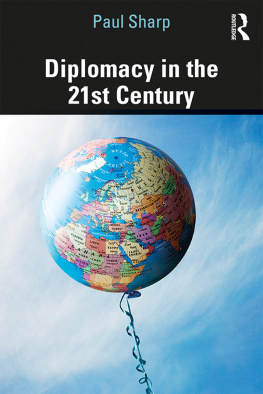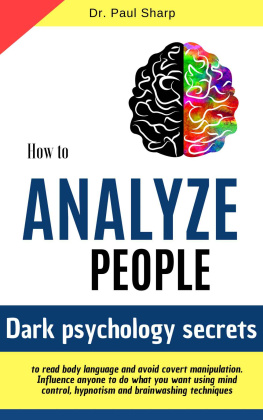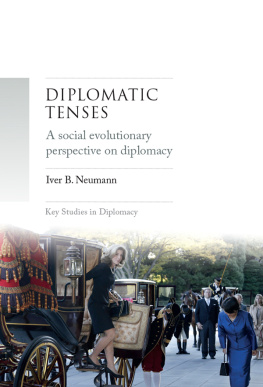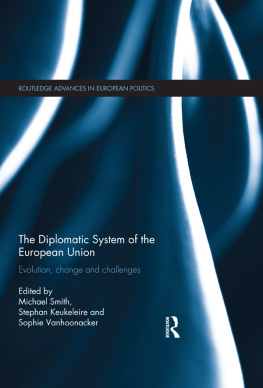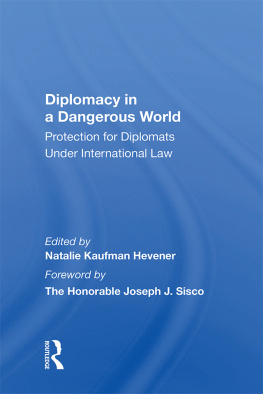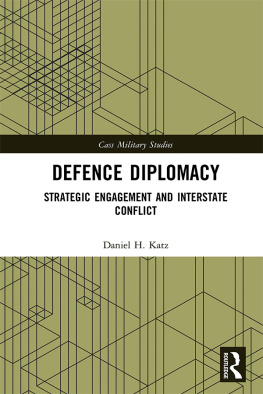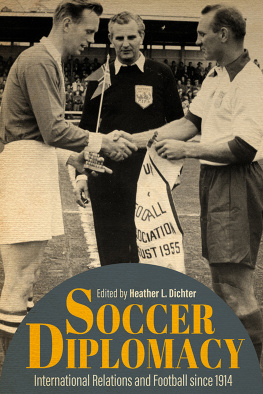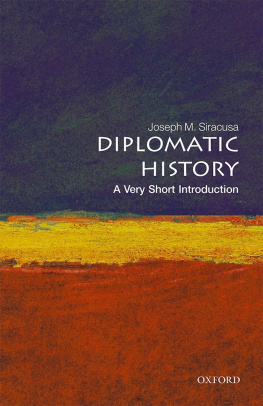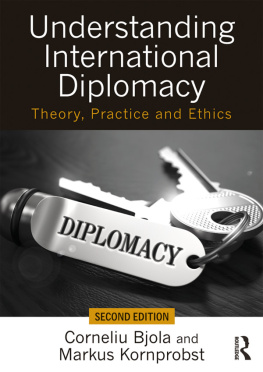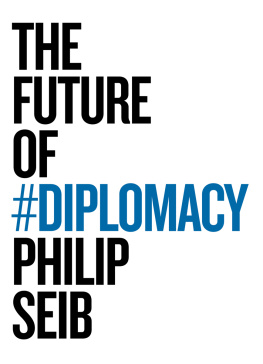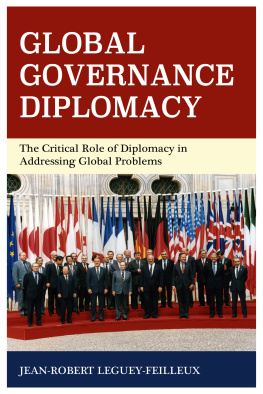A clear, concise, and highly accessible explanation of how diplomacy works, and why it is important, Paul Sharps book provides a timely and blunt assessment of both good and bad diplomacy.
Erik Goldstein, Boston University, USA
A very welcome textbook from a seasoned teacher and path-breaking scholar of diplomatic studies. Sharp approaches his subject with intelligence and tact, writes engagingly and precisely, outlining the historical necessity, the key skills and virtues of diplomats, as well as the bad and problematic practices of diplomacy.
Costas M. Constantinou, University of Cyprus
The clearly structured narration, well-explained history and concepts of diplomacy, excellent examples and straightforward language, combined with an up-to-date view of the challenges of modern diplomacy make this volume not only indispensable for students of diplomacy who have little background in the field, but also useful for the professional diplomat.
Ambassador Vahe Gabrielyan, Director of the Diplomatic School of Armenia
With clarity, boldness, and originality of thought, Paul Sharp describes the essence of diplomacy not just the formal institution but also the character of all human relations that reflect diplomatic values and norms. Often regarded as a weak force in international relations, the practice of diplomacy, if better explained and extended beyond the professionals to the general public, can strengthen an uncertain world order. Drawing our attention to the bad actors (specifically, leaders, media, and followers) we are living with today, Sharps keen analysis suggests, logically, that diplomacy is a public good that should be recognized as important and relevant to us all.
Alan Henrikson, The Fletcher School of Law and Diplomacy, Tufts University, USA
Very few people challenge the idea that diplomacy today is in crisis. New technologies of communication allow decision-makers to communicate with each other and with the public without diplomats, while populist waves across democracies threaten traditional elites. Budgets of ministers of foreign affairs are shrinking. This book is precisely about this crisis what is happening and why, why it should be worrying to everyone, and what we could do about it. Faced with bad leaders, bad media and bad followers, diplomacy needs to reinvent itself to adapt to the new and sometimes harsh realities of the 21st century. As this book masterfully shows, rather than focusing on the management of problems, diplomats, decision-makers and citizens alike need to learn again an ancient craft, the diplomatic management of relations between human beings. In this informed, accessible and timely book, Professor Sharp builds on his extensive knowledge and proven analytical skills to suggest possible solutions to the mess we are in. Anyone students, the general public, professionals with an interest for international politics should read it. It is particularly adapted as a textbook for undergraduate students in international relations courses.
Jrmie Cornut, Simon Fraser University, Canada
Paul Sharp has written one of the best introductory texts on diplomacy to date. The book is commendably clear and engaging as it traces the wide arc of diplomacy from its origins to its intriguing contemporary forms. All chapters come with concise introductions, illuminating text boxes with excellent examples, succinct summaries, and thoughtful exercises for group activity. This makes the book eminently useful for undergraduates and diplomatic trainees. But this introductory text does much more: with its detailed treatment of the challenges to contemporary diplomacy, we have here a leading authority clarifying the stakes of why diplomacy and diplomats matter in an age of rapid technological, social, and political uncertainty.
Deepak Nair, Assistant Professor of Political Science, National University of Singapore
Diplomacy in the 21st Century
This book provides an introduction to the theory and practice of diplomacy and its vital role in an era of increasing international uncertainty.
The work employs a distinctive diplomatic perspective on international relations and argues that the experience of conducting diplomacy gives rise to a set of priorities: first, the peaceful resolution of disputes; second, the avoidance of unwanted conflict; and, third, the minimization of the intensity of violent conflict where it has become unavoidable. It argues that changes in the international system require a shift in priorities from the diplomacy of problem-solving by building institutionalized cooperation, to the diplomacy of managing relationships between people. Divided into three sections, the first examines what is meant when we talk about diplomacy, why we need diplomats, and the operations of the modern diplomatic system of states. The second discusses the three bads, about which people generally worry: bad leaders, bad media, and bad followers. The idea of bad is considered in terms of the moral character, professional competence, and the consequences of what people do for us. The final section discusses diplomacy and bad diplomats, reviewing what people can do to help themselves and the professionals be good diplomats.
This book is intended as a primary text for courses in international diplomacy and as a supplementary text for courses on contemporary issues in international relations.
Paul Sharp is Professor of Political Science at the University of Minnesota Duluth, USA, and has authored or edited eight previous books on international relations.
First published 2019
by Routledge
2 Park Square, Milton Park, Abingdon, Oxon OX14 4RN
and by Routledge
52 Vanderbilt Avenue, New York, NY 10017
Routledge is an imprint of the Taylor & Francis Group, an informa business
2019 Paul Sharp
The right of Paul Sharp to be identified as author of this work has been asserted by him in accordance with sections 77 and 78 of the Copyright, Designs and Patents Act 1988.
All rights reserved. No part of this book may be reprinted or reproduced or utilised in any form or by any electronic, mechanical, or other means, now known or hereafter invented, including photocopying and recording, or in any information storage or retrieval system, without permission in writing from the publishers.
Trademark notice: Product or corporate names may be trademarks or registered trademarks, and are used only for identification and explanation without intent to infringe.
British Library Cataloguing-in-Publication Data
A catalogue record for this book is available from the British Library
Library of Congress Cataloging-in-Publication Data
Names: Sharp, Paul, 1953- author.
Title: Diplomacy in the 21st century : a brief introduction / Paul Sharp.Other titles: Diplomacy in the twenty-first century
Description: Abingdon, Oxon ; New York, NY : Routledge, 2019. | Includes bibliographical references and index.
Identifiers: LCCN 2019001660 (print) | LCCN 2019004999 (ebook) | ISBN 9781351371476 (Web PDF) | ISBN 9781351371469 (ePub) | ISBN 9781351371452 (Mobi) | ISBN 9781138554658 (hardback) | ISBN 9781138554665 (pbk.) | ISBN 9781315149110 (ebook)
Subjects: LCSH: Diplomacy. | Diplomats. | International relations.
Classification: LCC JZ1305 (ebook) | LCC JZ1305 .S4839 2019 (print) | DDC 327.2--dc23
LC record available at https://lccn.loc.gov/2019001660
ISBN: 978-1-138-55465-8 (hbk)
ISBN: 978-1-138-55466-5 (pbk)
ISBN: 978-1-315-14911-0 (ebk)
For Braelyn, Dixon, and Macy

